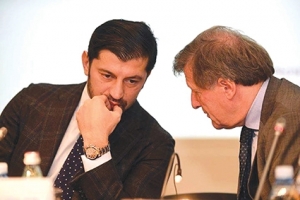Georgia: A Country with Energy Potential
Georgia’s Energy Sector held a conference in Tbilisi on November 11 – Progression Towards the EU and Electricity Trading Mechanism. Representatives of government and various organizations talked about recent achievements, future plans and their vision of Georgia’s European integration. The Conference was organized by USAID’s Governing for Growth (G4G) in Georgia and EU Project Civil Society Dialogue for Progress, implemented by World Experience for Georgia (WEG).
The main topics of discussion were Georgia gaining EU Energy Community membership and other important issues of the Association Agreement, such as Directive Requirements, gap analysis, energy security and sustainability; infrastructure, institutional development, and the Electricity Trading Mechanism.
Energy Community Negotiation issues were also raised at the Conference. In particular, Deputy Minister of the Ministry of Energy of Georgia, Mariam Valishvili, reported that negotiations on accession to the Community last over a year; they have already held a cycle of reforms and Georgia is expected to be ready to become a member of the Energy Community in September 2016.
“What Georgia has already achieved is remarkable and we can most definitely talk about its development and European future,” said EU Ambassador to Georgia, Janos Herman. “Together, we are planning a new program and we consider Georgia as an electricity hub which has great potential and opportunities.”
Alongside Mr. Herman, the conference was attended by representatives of the ministries of Energy, Economy and Sustainable Development, Environment and Natural Resources Protection; Electricity System Commercial Operator (ESCO); Georgian State Electrosystem; Georgian Oil and Gas Corporation; World Bank, European Union, and other international institutions; private energy market players, developers, investors, and energy sector think-tanks and experts.
Vice Prime Minister and Minister of Energy, Kakha Kaladze, opened the conference and noted the importance of the institutions’ inclusion in the country’s energy development. “I would like to thank USAID’s Governing for Growth (G4G) for organizing the conference and its involvement in the country’s economic development. We could not have achieved such success in our field without the support of foreign and local investment. Our Ministry always welcomes new projects and will continue to do so. Collaboration will not only contribute to successful economic development, but also help Georgia to join the European Energy System,” said Minister Kaladze.
Georgia’s Energy Sector - Progression Towards the EU and Electricity Trading Mechanism conference was organized by USAID’s Governing for Growth, which aims to support the Georgian government to create a better business enabling environment in which legal and regulatory reforms are fairly and transparently conceived, implemented and enforced through consultative process.
“Georgia has a lot of resources that can contribute to the success and proper development of the country. This especially concerns the energy sector, which is a priority for us. Therefore, with the help of this conference and in general, G4G is helping to create a better economic environment in Georgia,” said Milo Stevanovich, Chief of Party of USAID’s G4G.
Eka Karsaulidze











